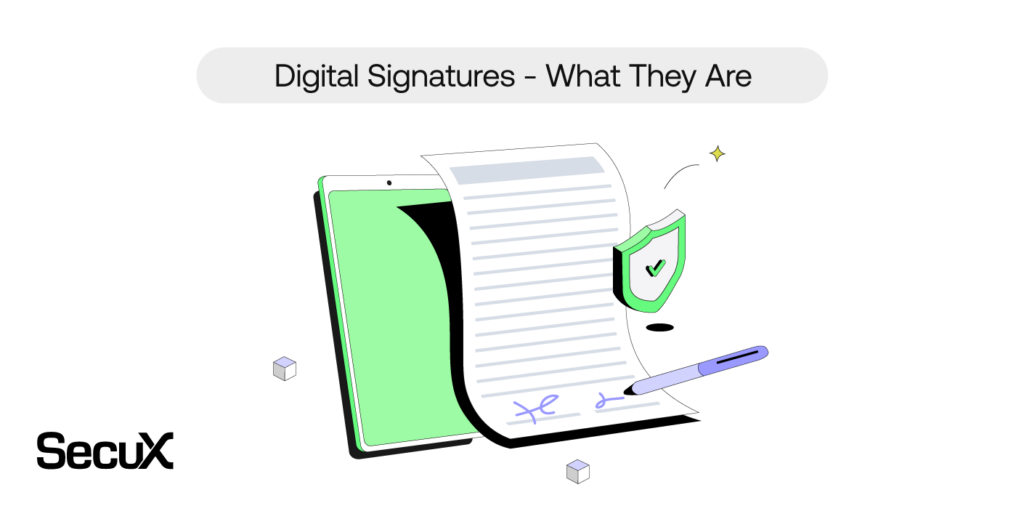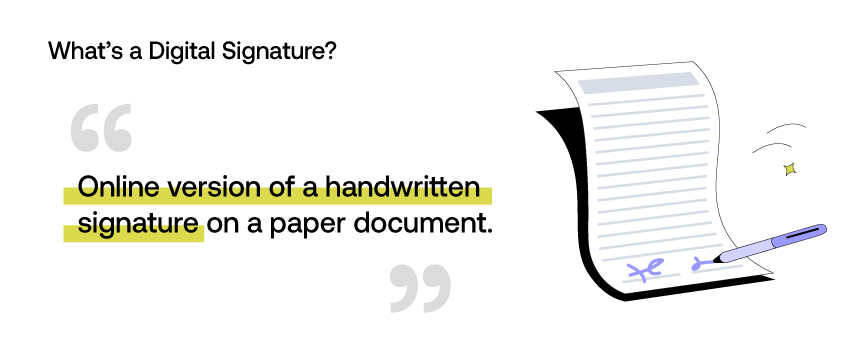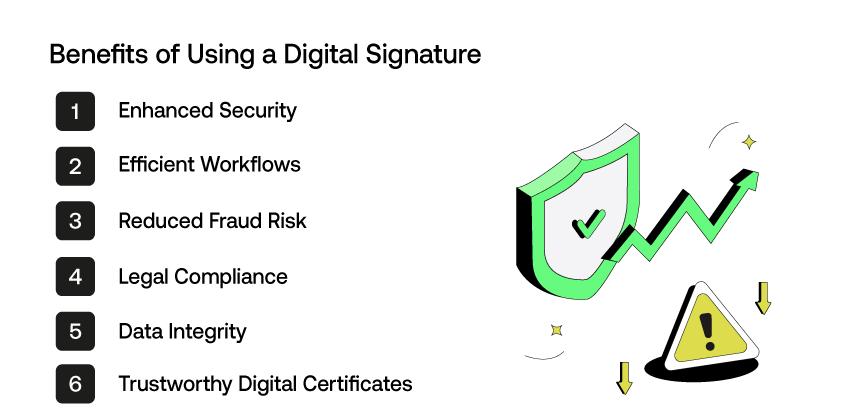
Disclaimer: The information provided in this article is for educational purposes only and should not be considered as financial advice.
Digital signatures are paramount to the way we authenticate, validate and secure our online transactions. They may be something we don’t even think about as we engage online, but their significance should not go unnoticed. They’re like fairy godmothers that are in the backdrop keeping us safe, and have a wide range of applications.
Let’s get to know more about these essential tools that lay within the heart of digital verification and trust.
Table of Contents
- The Importance of a Digital Signature
- The Role of Digital Signatures in Blockchains
- Types of Digital Signatures
- Benefits of Using a Digital Signature
- Conclusion
The Importance of a Digital Signature

Digital signatures can be seen as the online version of a handwritten signature on a paper document. They’re like a seal that proves something is genuine and supports its veracity in the digital world. Digital signatures are vital for building trust, keeping data safe, and making sure electronic documents are legally valid.
They help secure financial transactions, validate important contracts, and are essential for people, businesses, and governments in many different areas.
How They Work
Digital signatures work by utilizing complex mathematical algorithms that blend public and private keys. When a document is digitally signed, a unique code is created, known as a hash, which is then encrypted using the signer’s private key. This encrypted hash is attached to the document, serving as a digital fingerprint.
Recipients can use the signer’s public key to decrypt this hash and verify the document’s authenticity. However, it’s important to bear in mind that any changes made to the document will render the signature invalid. This process ensures data integrity and provides a robust security mechanism.
The Role of Digital Signatures in Blockchains
Blockchains are decentralized, distributed ledgers that record transactions and data across a network of computers. Digital signatures are used to authenticate the legitimacy of these transactions and ensure the reliability and integrity of the blockchain.
Every user within a blockchain network possesses a pair of cryptographic keys: a public key and a private key. When a participant initiates a transaction, they sign it with their private key. This digital signature, that is unique to the sender, serves as a proof of identity and ensures that the transaction hasn’t been tampered with during transmission.
When the transaction reaches the network, other participants can verify the signature using the sender’s public key. If the signature matches and the data remains unaltered, then the transaction is to be trusted.
The utilization of digital signatures within the blockchain ecosystem plays a crucial role in elevating its security and trustworthiness. These digital signatures are front and center in the process, providing cryptographic assurance of the authenticity and integrity of every transaction.
By using the sender’s private key, digital signatures validate the identity of the parties involved, making sure that only authorized individuals can make alterations or additions to the blockchain. This is an immutable method, relying on a public key infrastructure as a decentralized, transparent, and secure alternative.
Use Cases
- Cryptocurrency Transactions: Digital signatures secure crypto transactions with the sender’s private key. They ensure transaction authenticity, making them essential for digital currency systems.
- Supply Chain Integrity: Leveraging a digital signature, blockchains can ensure the authenticity of products within the supply chain. Each product or batch is uniquely identified through digital certificates, enabling stakeholders to trace its journey.
- Secure Voting Systems: Having a digital signature can revolutionize voting systems by enabling secure and verifiable electronic voting. These signatures authenticate voters, safeguarding electoral integrity, and creating transparent election processes.
- Smart Contracts: A digital signature can work in tandem with smart contracts, executing agreements automatically when conditions are met. Using a public key infrastructure, a digital signature verifies the authorization of parties to the contract, allowing self-executing agreements.
- Document Signing: Beyond blockchain, a digital signature can serve the broader need to sign documents electronically.
Types of Digital Signatures
- Simple Electronic Signature (digital signature): This is a basic digital signatures that involve the use of a private key (private key) to sign documents (sign documents) electronically.
- Advanced Electronic Signature: This type is more secure than simple electronic signatures and often involves additional security measures or biometric authentication (electronic signature) similar to our Shield BIO.
- Qualified Electronic Signatures: This digital signature meets specific legal requirements and is often used for legally binding documents.
- Biometric Signatures: These signatures use unique physical or behavioral characteristics for authentication, such as fingerprints or handwriting patterns.
- Timestamped Signatures: These include a timestamp to prove that the document was signed at a specific time (digital signature transaction), ensuring its integrity.
- Document-Level Signatures: In addition to individual signatures, an entire document can be signed to ensure its overall integrity.
Benefits of Using a Digital Signature
- Enhanced Security
- Efficient Workflows
- Reduced Fraud Risk
- Legal Compliance
- Data Integrity
- Trustworthy Digital Certificates

Conclusion
In a world where everything is about security, digital signatures, with the support of digital certificate technology, are imperative to the digital landscape. These signatures, created through electronic signature methods, are backed by public key infrastructure, ensuring trust and reliability.
By using digital signature technology, these signatures make every digital signature transaction not only secure but also tamper-proof, ensuring the integrity of electronic documents. In an increasingly interconnected world, digital certificates play an indispensable role in authenticating users and enhancing the overall safety of online interactions.
Related Articles
Multi-Signature Wallets – Are They Right for You?
Public Key Infrastructure Explained
Sources
Why digital signatures are essential for blockchains
Digital signatures | Example use cases for a digital signature

0 comments